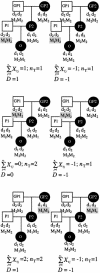Correcting for a potential bias in the pedigree disequilibrium test
- PMID: 11254459
- PMCID: PMC1275627
- DOI: 10.1086/319525
Correcting for a potential bias in the pedigree disequilibrium test
Figures
Comment on
-
A test for linkage and association in general pedigrees: the pedigree disequilibrium test.Am J Hum Genet. 2000 Jul;67(1):146-54. doi: 10.1086/302957. Epub 2000 May 23. Am J Hum Genet. 2000. PMID: 10825280 Free PMC article.
References
Electronic-Database Information
-
- Duke Center for Human Genetics, The, http://wwwchg.mc.duke.edu/ (software for conducting PDT-avg and PDT-sum analyses)
References
-
- Abecasis GR, Cookson WOC, Cardon LR (2000) Pedigree tests of transmission disequilibrium. Eur J Hum Genet 8:545–551 - PubMed
-
- Rabinowitz D, Laird N (2000) A unified approach to adjusting association tests for population admixture with arbitrary pedigree structure and arbitrary missing marker information. Hum Hered 50:211–223 - PubMed
-
- Teng J, Risch N (1999) The relative power of family-based and case-control designs for linkage disequilibrium studies of complex human diseases. II. Individual genotyping. Genome Res 9:234–241 - PubMed
Publication types
MeSH terms
Grants and funding
LinkOut - more resources
Full Text Sources
Other Literature Sources


